Transcription of Parenting Plan - Wa
1 RCW , .181, .187, .194 Mandatory Form (07/2017) FL All Family 140 Parenting plan p. 1 of 14 Superior Court of Washington, County of In re: Petitioner/s (person/s who started this case): And Respondent/s (other party/parties): No. Parenting plan (PPP / PPT / PP) Clerk s action required: 1. Parenting plan 1. This Parenting plan is a (check one): Proposal (request) by a parent (name/s): . It is not a signed court order. (PPP) Court order signed by a judge or commissioner. This is a (check one): Temporary order. (PPT) Final order. (PP) This final Parenting plan changes the last final Parenting plan .
2 2. Children This Parenting plan is for the following children: Child s name Age Child s name Age 1. 4. 2. 5. 3. 6. 3. Reasons for putting limitations on a parent (under RCW ) a. Abandonment, neglect, child abuse, domestic violence, assault, or sex offense. (If a parent has any of these problems, the court must limit that parent s contact with the children, the right to make decisions for the children, and may not require dispute resolution other than court.) Neither parent has any of these problems. (Skip to ) RCW , .181, .187, .194 Mandatory Form (07/2017) FL All Family 140 Parenting plan p.
3 2 of 14 A parent has one or more of these problems as follows (check all that apply): Abandonment (Parent s name): intentionally abandoned a child listed in 2 for an extended time. Neglect (Parent s name): substantially refused to perform his/her Parenting duties for a child listed in 2. Child Abuse (Parent s name): (or someone living in that parent s home) abused or threatened to abuse a child. The abuse was (check all that apply): physical sexual repeated emotional abuse. Domestic Violence (Parent s name): (or someone living in that parent s home) has a history of domestic violence as defined in RCW (1).
4 Assault (Parent s name): (or someone living in that parent s home) has assaulted or sexually assaulted someone causing grievous physical harm, causing fear of such harm or resulting in a pregnancy. Sex Offense (Parent s name): has been convicted of a sex offense as an adult. Someone living in (parent s name): s home has been convicted as an adult or adjudicated as a juvenile of a sex offense. b. Other problems that may harm the children s best interests. (If a parent has any of these problems, the court may limit that parent s contact with the children and right to make decisions for the children.)
5 Neither parent has any of these problems. (Skip to 4.) A parent has one or more of these problems as follows (check all that apply): Neglect (Parent s name): neglected his/her parental duties towards a child listed in 2. Emotional or physical problem (Parent s name): has a long-term emotional or physical problem that gets in the way of his/her ability to parent. Substance Abuse (Parent s name): has a long-term problem with drugs, alcohol, or other substances that gets in the way of his/her ability to parent. Lack of emotional ties (Parent s name): has few or no emotional ties with a child listed in 2.
6 Abusive use of conflict (Parent s name): uses conflict in a way that endangers or damages the psychological development of a child listed in 2. Withholding the child (Parent s name): has kept the other parent away from a child listed in 2 for a long time, without a good reason. Other (specify): RCW , .181, .187, .194 Mandatory Form (07/2017) FL All Family 140 Parenting plan p. 3 of 14 4. Limitations on a parent Does not apply. There are no reasons for limitations checked in or above. (Skip to 5.) No limitations despite reasons (explain why there are no limitations on a parent even though there are reasons for limitations checked in 3a.)
7 Or above): The following limits or conditions apply to (parent s name): (check all that apply): No contact with the children. Limited contact as shown in the Parenting Time Schedule (sections 8 11) below. Limited contact as follows (specify schedule, list all contact here instead of in a Parenting Time Schedule, skip sections 8 11): Supervised contact. All Parenting time shall be supervised. Any costs of supervision must be paid by (name): The supervisor shall be: a professional supervisor (name): a non-professional supervisor (name): The dates and times of supervised contact will be: as shown in the Parenting Time Schedule (sections 8 11) below.
8 As follows (specify): (Specific rules for supervision, if any): Other limitations or conditions during Parenting time (specify): Evaluation or treatment required. (Name): must: be evaluated for: . start (or continue) and comply with treatment: as recommended by the evaluation. as follows (specify kind of treatment and any other details): provide a copy of the evaluation and compliance reports (specify details): RCW , .181, .187, .194 Mandatory Form (07/2017) FL All Family 140 Parenting plan p. 4 of 14 If this parent does not follow the evaluation or treatment requirements above, then (what happens): 5.
9 Decision-making When the children are with you, you are responsible for them. You can make day-to-day decisions for the children when they are with you, including decisions about safety and emergency health care. Major decisions must be made as follows. a. Who can make major decisions about the children? Type of Major Decision Joint (parents make these decisions together) Limited (only the parent named below has authority to make these decisions) School / Educational (Name): Health care (not emergency) (Name): Other: (Name): Other: (Name): Other: (Name): b. Reasons for limits on major decision-making, if any: There are no reasons to limit major decision-making.
10 Major decision-making must be limited because one of the parents has problems as described in above. Major decision-making should be limited because (check all that apply): Both parents are against shared decision-making. One of the parents does not want to share decision-making and this is reasonable because of: problems as described in above. the history of each parent s participation in decision-making. the parents ability and desire to cooperate with each other in decision-making. the distance between the parents homes makes it hard to make timely decisions together. 6. Dispute Resolution If you and the other parent disagree: From time to time, the parents may have disagreements about shared decisions or about what parts of this Parenting plan mean.
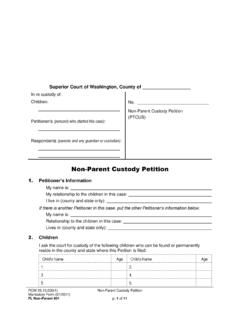
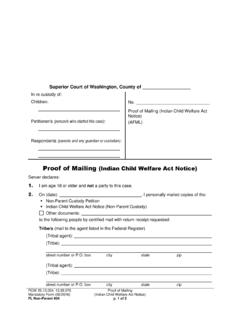
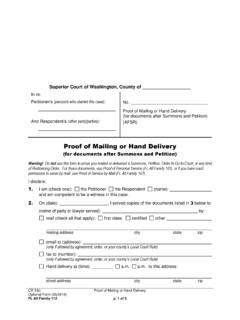
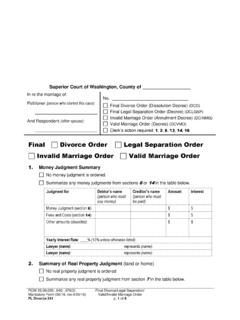
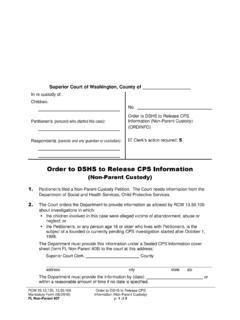
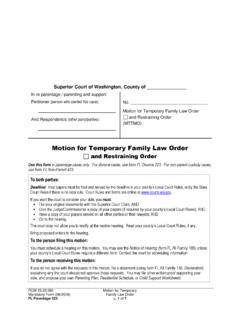
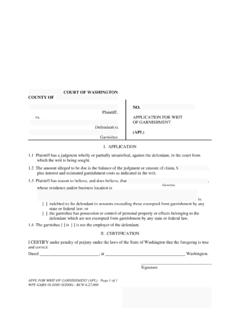
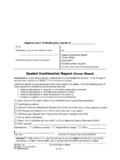
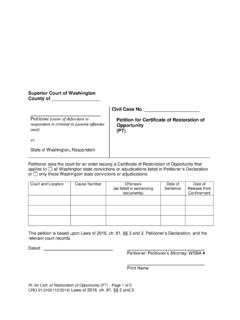
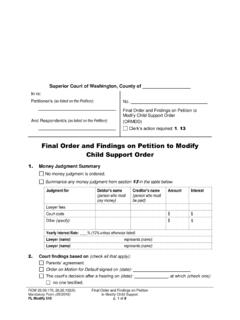


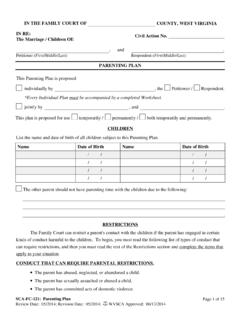

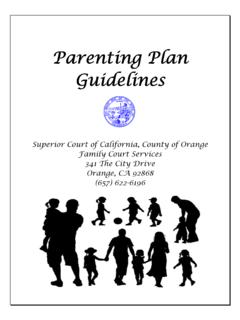
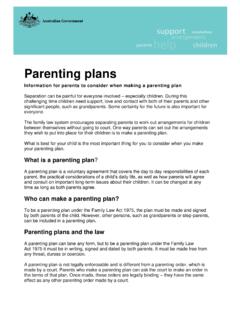
![PARENTING PLAN Father/Mother [no.] child/ren Child/ren ...](/cache/preview/1/f/9/5/3/4/9/0/thumb-1f953490d6f503c971bb975ed38df46c.jpg)
